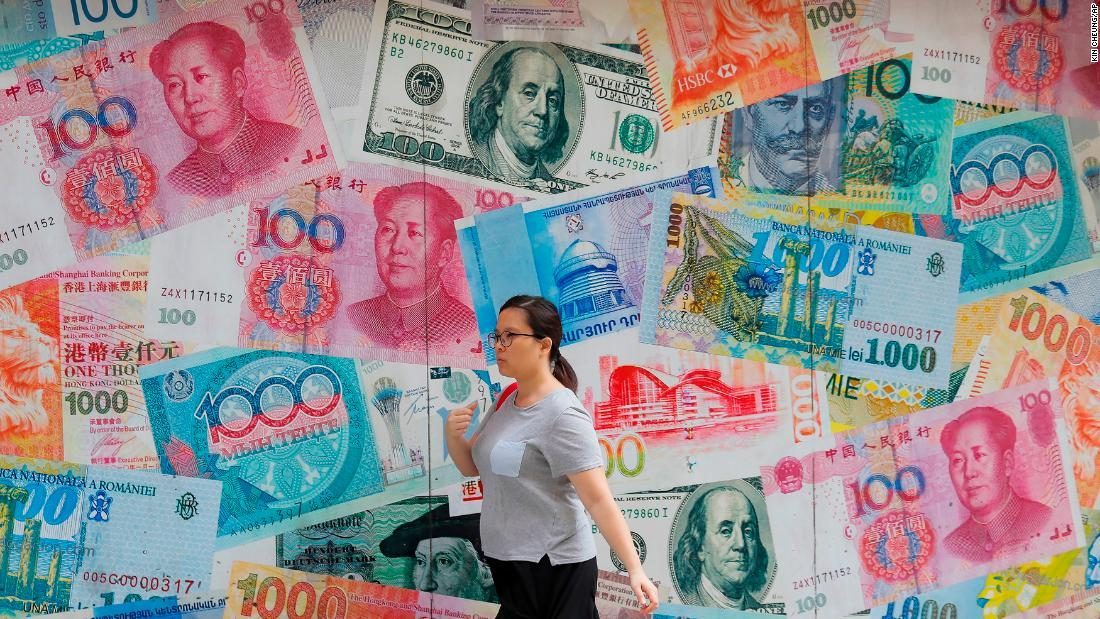Blockades affect markets and the yuan in China 0:53
Hong Kong (CNN Business) --
The Chinese currency is falling rapidly as the world's second-largest economy reels under the weight of Covid-19 restrictions.
Since the beginning of the year, investors have been pulling money out of China, fueled by concerns about increased lockdowns in major cities, and by Beijing's close ties to Moscow following the Russian invasion of Ukraine.
These ties have raised fears that China could be targeted by Western sanctions if it helps Moscow.
The yuan — also known as the renminbi — hit its lowest levels since September 2020 early Friday in the land market controlled by Beijing, as well as abroad, where it can trade more freely.
This is what it's like to leave Shanghai's harsh covid lockdown and seek a "whole new world" outside of China
The currency recovered later in the day to trade around 6.78 per US dollar.
In the last three months, the yuan lost 7% of its value against the dollar.
In April alone, it recorded its biggest monthly drop.
In the same month, China's forex reserves suffered the biggest drop since the end of 2016.
It's a sharp turnaround for the yuan, which was one of the world's strongest currencies in 2021.
advertising
Analysts say a combination of Beijing's covid restrictions and US Federal Reserve rate hikes have made investors wary of keeping their money in China.
The country witnessed record Chinese bond outflows in February and March.
"A stronger US dollar, a lack of confidence in China's economic outlook and a narrowing Sino-US interest rate spread have all contributed to the currency's rapid depreciation," Goldman analysts said. Sachs this Friday.
Lockdowns continue in China
So far, at least 32 cities across the country remain under full or partial lockdowns as President Xi Jinping's government relentlessly pursues its covid-zero policy, which has hit almost every industry and set the economy back.
Authorities this week tightened COVID restrictions in the country's two major cities — Shanghai and Beijing — after Xi vowed to "unswervingly" double down on the strict zero COVID policy.
Tesla sales in China fall 98% 1:06
Concerns about these restrictions were further intensified on Friday, when China banned citizens from going abroad for non-essential reasons.
“Jervousness over China remaining closed for the foreseeable future” has translated into a preference for the US dollar over the yuan, Stephen Innes, managing partner at SPI Asset Management said in a research note on Friday.
China's Balancing Act
The central bank has tried to limit the damage.
In an unprecedented move, the People's Bank of China in late April lowered the amount of foreign exchange that banks must hold as reserves to 8% from 9%.
This stopped the decline of the yuan for a few days, but it soon fell again.
A weaker currency has some advantages.
As the yuan becomes cheaper, Chinese exports are more competitive.
This could help China's struggling economy, which posted the slowest pace of export growth in two years last month.
As long as the pace of depreciation is restrained, "policymakers could welcome a weaker currency," Goldman Sachs analysts said.
But a rapid fall in the currency can trigger investor panic and capital flight, destabilizing the economy and causing chain reactions in international markets.
Analysts at UBS expect the yuan to weaken further in the coming months, breaking through the 7 per dollar level at some point.
The last time it traded below that threshold was in July 2020, after which it began to appreciate as the Fed maintained easy monetary policy and the Chinese economy recovered from the pandemic.
The lowest value of the registered yuan is 8.28 per dollar.
It hadn't traded this low since July 2005, when Beijing ended its long-standing policy of pegging the currency to the dollar and allowed it to appreciate.
Chinese authorities are likely to tighten controls on capital outflows if the depreciation gets out of hand, they said.
"The next few days will be key," Goldman analysts said.
China

